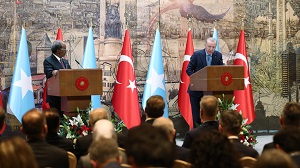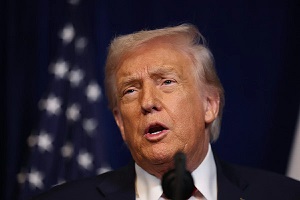America’s multilateralism election - By Javier Solana, The Jordan Times
MADRID — When Donald Trump became the US Republican Party’s presidential nominee in 2016, many predicted that he would tone down his inflammatory rhetoric during the election campaign against Hillary Clinton in order to attract moderate voters. After Trump was elected without having shown an iota of the hoped-for restraint, many said that the presidency and congressional Republicans would make him adopt a more dignified tone.
Today, we know how naive those predictions were. Trump did not temper himself once in office. If anything, he became even more reckless and incendiary. The biggest worry now is not Trump’s unchanged style, but the fact that the Republican Party and the US government have molded themselves to his likeness. Few Republicans dare to question him and, within the administration, Trump has surrounded himself with a camarilla of yes-men, dismissing or sidelining the few who opposed his more preposterous ideas. With the presidential election just around the corner, it is worth recalling the many ways Trump and the GOP have completely abdicated any sense of US responsibility towards the rest of the world.
For starters, Trump has consistently resorted to nationalism, reflected in crude slogans like “America First” and “Make America Great Again”. He has reviled every attempt at global cooperation in the name of an anachronistic conception of national sovereignty. In the face of the current pandemic, Trump has embraced so-called vaccine nationalism and is refusing to participate in COVAX, an initiative supported by the World Health Organisation (WHO) that seeks to guarantee equitable distribution of any COVID-19 vaccine.
Time and again, Trump has disparaged multilateral solutions in favor of bilateral agreements and unilateral action. His administration has questioned many of America’s international commitments and has even disavowed some of them, most notably the 2015 Paris climate agreement and the nuclear deal with Iran, imposing, in the latter case, unfair secondary sanctions on third countries. Trump has essentially based his foreign policy on coups de théâtre, such as the January 2020 assassination of the Iranian General Qassem Suleimani and the earlier recognition of Jerusalem as the capital of Israel.
Trump has made it clear that he views international relations as a zero-sum game. This stance has underpinned his tariff policies and, specifically, his “trade war” with China. In 2018, he tweeted that, “When a country [USA] is losing many billions of dollars on trade with virtually every country it does business with, trade wars are good, and easy to win.” Moreover, Trump expects to benefit personally from US diplomacy, as shown by the Ukraine scandal that led to his impeachment by the US House of Representatives last December.
Finally, Trump has shown an illiberal side, disdaining institutional checks and balances and disparaging US media outlets for propagating “fake news”, a stone hurled within a glass house. Internationally, Trump has supported a series of illiberal leaders who, like him, are more concerned with their own political survival than with their countries’ democratic health. These leaders have no use for human rights except when they invoke them selectively for self-interested reasons.
Under Trump’s turbulent tenure, the United States has openly renounced guardianship of the “liberal order”. But we should not delude ourselves into thinking that a victory for his Democratic challenger, Joe Biden, will mean an immediate return to the world of yesterday. For all their radical differences, the candidates’ programmes also have a few elements in common.
For example, Biden advocates giving preferential treatment to US products and subsidising domestic industries. The Democratic Party also has toughened its stance toward China, although it remains less aggressive than Trump on the issue, and emphasises the desirability of relying on allies. No matter who wins on November 3, the Sino-American battle for technological supremacy, including in the area of artificial intelligence, will remain fierce.
In any case, it would be a mistake to idealise the past and aspire to reproduce it. America’s tenure as the leading global power has had low points as well as highlights, and the country’s structural problems existed well before Trump took office, in fact, some of them help explain his election in 2016. The same could be said of the many tensions currently afflicting the international system.
We therefore must set nostalgia aside and focus our attention on confronting the world of tomorrow. The COVID-19 pandemic has starkly demonstrated that multilateral cooperation is not an option, but an obligation, and yet we are allowing many international organisations to decline before our eyes. A vital player like the WHO is currently suffering from a troubling lack of resources, especially since Trump withdrew US funding. Meanwhile, the World Trade Organisation’s Dispute Settlement Body remains paralysed because Trump refuses to allow the appointment of new judges to its Appellate Body.
Just as the world will need to reform these institutions in order to adapt them to the environments they will have to navigate, it will also need new global regulations for challenges posed by AI and other emerging technologies. And, of course, we must continue to advance firmly in the fight against climate change. China recently declared its intention to become carbon neutral by 2060, while the European Commission under President Ursula von der Leyen has made the European Green Deal one of its main priorities. This is the line we must follow.
Much is at stake for both America and the world on November 3. Although a potential Biden administration would not resolve all the problems it would inherit, it would allow the US to renew abandoned commitments, approach its Western allies as true partners and friends, and rediscover a less melodramatic and more rational foreign policy. Trump’s reelection, on the other hand, would deepen the tendencies described here, widen the breach between the US and the European Union, and probably even inflict irreversible damage on international cooperation.
Whatever the US election’s outcome, the world will have to manage a simple, immutable reality in the best way possible: no country, however important, can confront the global challenges we face alone.
Javier Solana, a former EU high representative for foreign affairs and security policy, secretary general of NATO, and foreign minister of Spain, is president of EsadeGeo — Centre for Global Economy and Geopolitics and Distinguished Fellow at the Brookings Institution. Copyright: Project Syndicate, 2020. www.project-syndicate.org
Latest News
-
 Turkey calls 'Israel's' recognition of Somaliland 'illegitimate'
Turkey calls 'Israel's' recognition of Somaliland 'illegitimate'
-
 Trump warns Hamas, Iran after Netanyahu talks
Trump warns Hamas, Iran after Netanyahu talks
-
 UAE denies Saudi accusation of fuelling Yemen conflict
UAE denies Saudi accusation of fuelling Yemen conflict
-
 Syria reveals new post-Assad banknotes
Syria reveals new post-Assad banknotes
-
 Hamas Armed Wing Refuses to Surrender Weapons, Confirms Spokesman Killed by Israel in August
Hamas Armed Wing Refuses to Surrender Weapons, Confirms Spokesman Killed by Israel in August